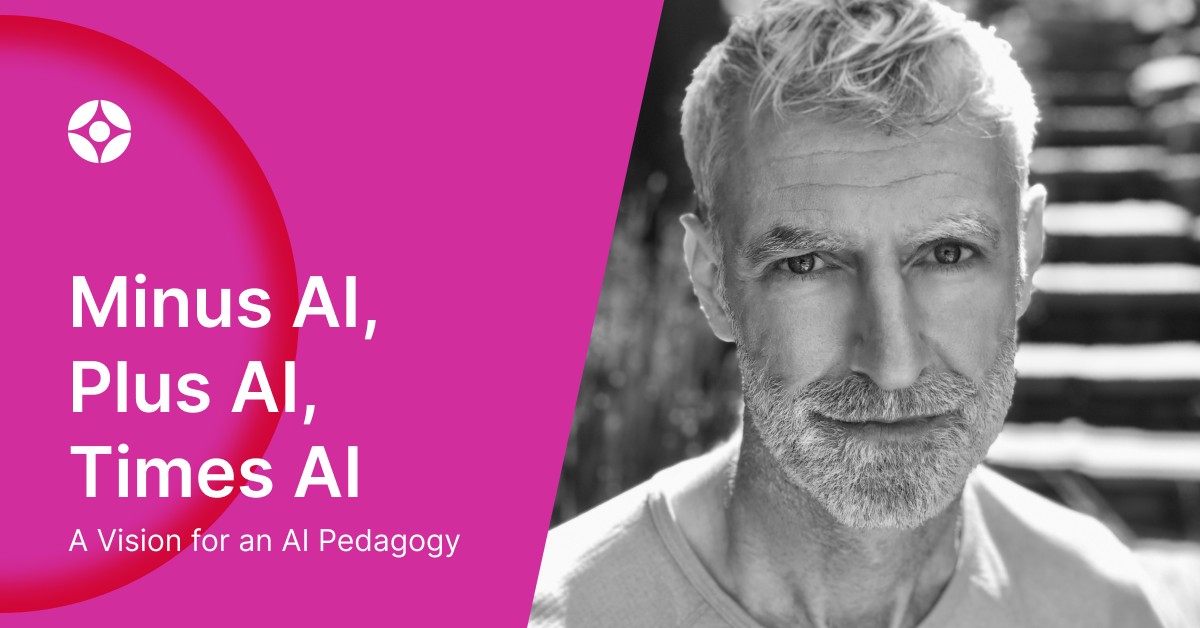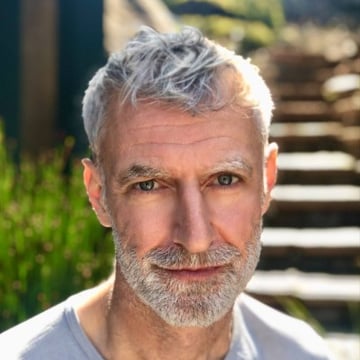

Virtual Event: Minus AI, Plus AI, Times AI — A Vision for an AI Pedagogy
Event Recap: Read the Article Here
About the Talk:
Greg Niemeyer explores how artificial intelligence is transforming what it means to learn, teach, and think. In this talk, “Minus AI, Plus AI, Times AI,” he outlines a framework for education in three modes: Minus AI, where learning happens the old fashioned way with just the human brain and human experience; Plus AI, where AI becomes an intentional, transparent collaborator with humans; and Times AI, where AI redefines knowledge itself.
Niemeyer says that because of AI, teachers need to change how they teach and students need to change how they learn so that schools don’t fall behind. He’s been testing how AI can help schools and has found that everything—teachers, students, and the technology—works together like one big team.Teachers have to figure out when to use less AI, more AI, or a mix it to ensure students stay curious, think deeply, work together, and find real meaning in what they study.
About the Speaker:
Greg Niemeyer is a data artist and Professor of Media Innovation in the Department of Art Practice at the University of California, Berkeley. He is also the former director and co-founder of the Berkeley Center for New Media, where he helped build an internationally recognized hub for research, teaching, and public engagement at the intersections of technology, culture, and the arts. His academic trajectory began with studies in Classics and Photography in Switzerland, before a move to the Bay Area in 1992 set him on the path toward new media. In 1997, he received his MFA in New Genres from Stanford University, a program that encouraged his interest in experimental forms and the blending of media, technology, and conceptual art.
From an early age, Niemeyer was fascinated by mirrors—not just as physical objects, but as metaphors for media itself. He continues to describe his practice as a lifelong pursuit of making mirrors: systems that allow us to see from perspectives other than our own, reflecting both what we want to see and what we would rather not. For Niemeyer, such mirrors are essential tools. They help us recognize the contexts that shape our lives, the fragile ecosystems on which we depend, and the deep entanglement of human and non-human futures. By showing us what we might otherwise overlook, his mirrors invite us to make better, more informed choices.
Niemeyer’s art has been exhibited internationally at venues including the ZKM Center for Art and Media in Karlsruhe, the San Francisco Museum of Modern Art, the San Jose Museum of Art, the Stedelijk Museum in Amsterdam, the Townhouse Gallery in Cairo, museums in Zurich and New York, and many other institutions. His work has been supported by the MacArthur Foundation, the National Endowment for the Arts, Intel, Pro Helvetia, and numerous other organizations. These commissions and awards recognize a career defined by both conceptual rigor and technical experimentation.
Across more than two decades of practice, Niemeyer has produced projects that combine critical inquiry with accessible, often playful forms. Early works such as Gravity (Cooper Union, New York, 1997) and PING (SFMOMA, 2001) explored the relationship between networks and perception. Later projects expanded into sound and performance, as in Oxygen Flute (San Jose Museum of Art, 2002), Organum Playtest (BAMPFA, 2005), and Good Morning Flowers (San Francisco International Film Festival and Townhouse Gallery, Cairo, 2006). His commitment to addressing environmental and global themes is evident in projects like the Maldives Pavilion at the Venice Biennale (2013), gnosisong (CCD Mexico City, 2015), //supraliminal (ZKM, 2017), and Sonic Web (ZKM, 2018). More recent works include Quantopia (Yerba Buena Center for the Arts, 2019), Who Owns the Rain (C-Lab Taipei, Taiwan, 2024), Sacramento River Paradox (120710 Gallery, Berkeley, CA, 2024), Synchronicity (Salesforce Tower, 2024), To The Sun (UC Berkeley Carillon, 2025) and Hand Signs (120710 Gallery, Berkeley, CA, 2025),
The core of Niemeyer’s current practice is a data-driven animation. Large datasets and live data streams serve as his raw material, transformed into visual and sonic experiences that function as mirrors of the unseen. Air quality, water cycles, networks of care—these essential resources and infrastructures become sensible in his work, often revealing fragile patterns or emergent dynamics. By materializing what data holds, Niemeyer aims to spark new awareness of how we live now and how we might evolve from an impossible present toward more possible futures.
Speakers
Agenda




Attendees

















